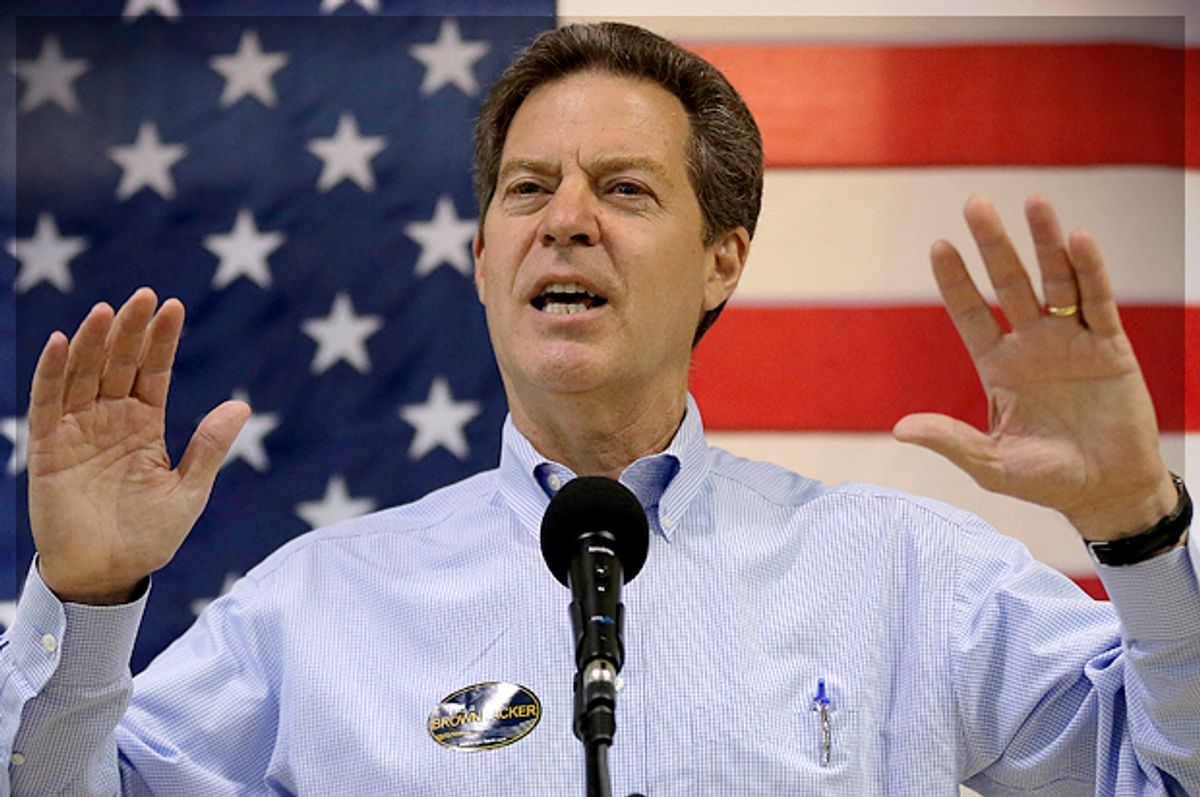As he formally begins his second term on Monday, it's hard to imagine how life could get much worse for Kansas Gov. Sam Brownback. Sure, he almost didn't make it this far; amid voter backlash against his budget-busting tax cuts for the wealthy, Brownback only barely fended off a strong re-election challenge from Democrat Paul Davis last year. But at this point, one has to wonder if Brownback wouldn't have been better off just losing to Davis.
Less than a week after securing a second term with 50 percent of the vote, new revenue figures showed that Kansas' budget situation was even more dire than previously realized. Lawmakers must close a nearly $280 million budget gap by June, and their options for doing so are remarkably limited. Brownback's piggybacking on Obamacare, infrastructure cuts, and further gutting of the state's long-troubled pension fund only move the needle so far. And with an education system that's already poorly funded, it's unclear how Kansas schools could sustain further cuts. (Last month, a state court ruled that school funding comes up well short of what is required under the Kansas Constitution.)
So the anti-tax crusader has little choice but to contemplate revenue increases -- and according to the Wichita Eagle, Brownback is considering a range of options, including increased taxes on cigarettes and alcohol, ending some exemptions for sales and income taxes, increasing sales taxes, delaying further income tax cuts, and altering his tax law's requirement that tax rates go down further if revenue increases by more than two percent.
"[W]e will lay out a two-year budget. It will be in balance. It will be revenue positive,” Brownback said last week. It marks a sharp turnaround from his campaign rhetoric, when he vowed to proceed full-steam ahead with his anti-tax agenda, which he insisted was on the verge of delivering his promised "shot of adrenaline" to the state's economy. As if there were any remaining doubt, it also underscores that Brownback's persistent presidential fantasies are pathetically delusional.
Oh -- and then there's the bit about how the governor is under investigation.
Late last week, the Associated Press reported that a federal grand jury is investigating loans made to Brownback's re-election campaign in 2013 and 2014. The only loans included on campaign finance disclosure reports those two years were from Brownback himself and his lieutenant governor, Jeff Colyer. As the AP noted, the loans -- quickly repaid -- raised significant questions:
Colyer loaned Brownback’s campaign $500,000 in August – the third such loan the governor’s running mate made to their re-election bid – according to the last disclosure report, filed days before the November general election.
Such large loans by candidates to campaigns are uncommon in Kansas, and the pattern of repaying one within days is an unusual move that generated unanswered questions about where Colyer obtained such a large amount of cash.
Brownback’s campaign paid Colyer back $400,000 on Nov. 21, about two weeks after the election, according to the finance report filed with the Secretary of State’s office on Thursday. There is still $100,000 from the loan not yet repaid as of Dec. 31.
Brownback isn't commenting on the investigation, beyond referring local reporters to his office's statement last week that the investigation lacks merit. The probe comes as top Brownback loyalists find themselves ensnared in an FBI "pay-to-play" investigation.
In the meantime, the governor confronts a budget crisis of his own making -- and an economic climate that is prompting many Kansans to abandon the Sunflower State. Amid the havoc he wreaked on the state, Kansas ranked seventh in the nation last year among states residents left. Pitching his tax cuts two years ago, however, the governor predicted a very different situation.
"It will leave more than a billion dollars in the hands of Kansans," Brownback said in the summer of 2012. "They know far better how to spend their money than the state government. An expanding economy and growing population will directly benefit our schools and local governments."



Shares